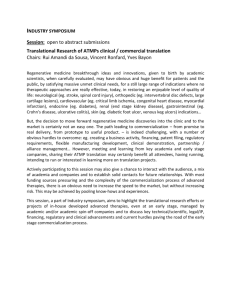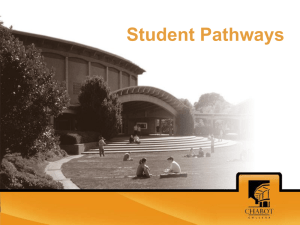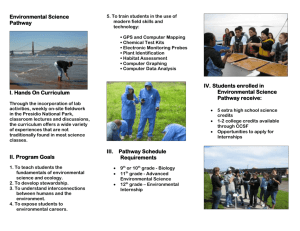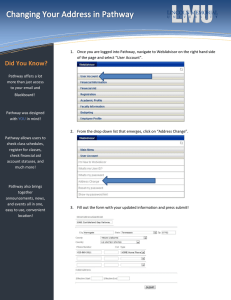ABSTRACT: 2014 ELATE Institutional Action Project Poster Symposium
advertisement
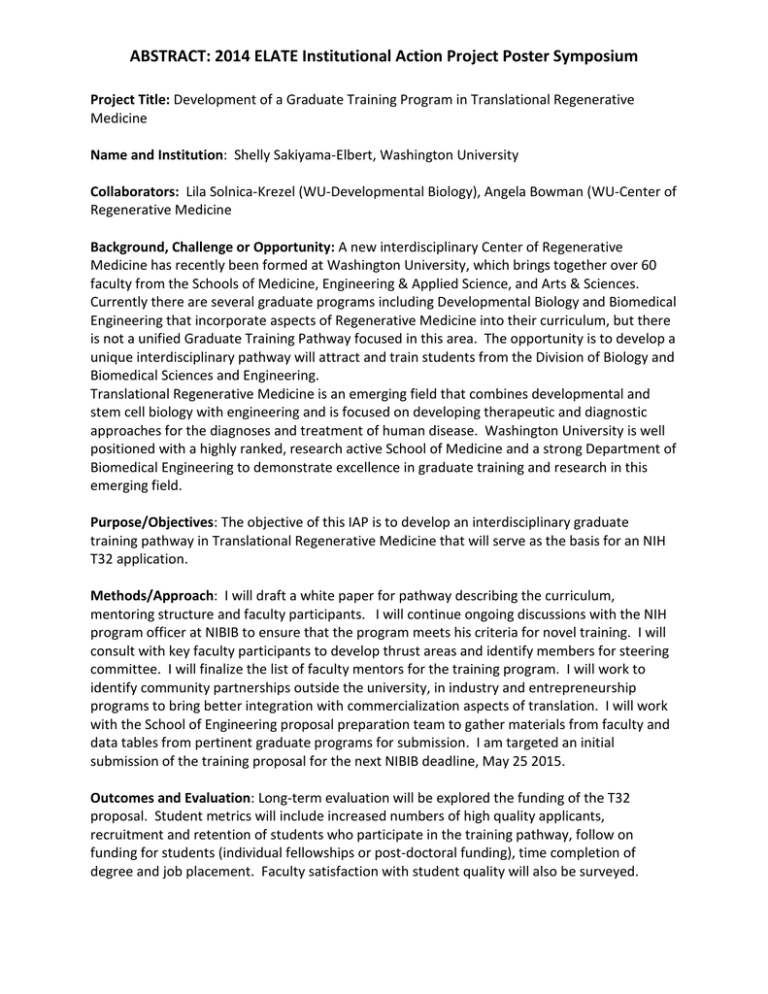
ABSTRACT: 2014 ELATE Institutional Action Project Poster Symposium Project Title: Development of a Graduate Training Program in Translational Regenerative Medicine Name and Institution: Shelly Sakiyama-Elbert, Washington University Collaborators: Lila Solnica-Krezel (WU-Developmental Biology), Angela Bowman (WU-Center of Regenerative Medicine Background, Challenge or Opportunity: A new interdisciplinary Center of Regenerative Medicine has recently been formed at Washington University, which brings together over 60 faculty from the Schools of Medicine, Engineering & Applied Science, and Arts & Sciences. Currently there are several graduate programs including Developmental Biology and Biomedical Engineering that incorporate aspects of Regenerative Medicine into their curriculum, but there is not a unified Graduate Training Pathway focused in this area. The opportunity is to develop a unique interdisciplinary pathway will attract and train students from the Division of Biology and Biomedical Sciences and Engineering. Translational Regenerative Medicine is an emerging field that combines developmental and stem cell biology with engineering and is focused on developing therapeutic and diagnostic approaches for the diagnoses and treatment of human disease. Washington University is well positioned with a highly ranked, research active School of Medicine and a strong Department of Biomedical Engineering to demonstrate excellence in graduate training and research in this emerging field. Purpose/Objectives: The objective of this IAP is to develop an interdisciplinary graduate training pathway in Translational Regenerative Medicine that will serve as the basis for an NIH T32 application. Methods/Approach: I will draft a white paper for pathway describing the curriculum, mentoring structure and faculty participants. I will continue ongoing discussions with the NIH program officer at NIBIB to ensure that the program meets his criteria for novel training. I will consult with key faculty participants to develop thrust areas and identify members for steering committee. I will finalize the list of faculty mentors for the training program. I will work to identify community partnerships outside the university, in industry and entrepreneurship programs to bring better integration with commercialization aspects of translation. I will work with the School of Engineering proposal preparation team to gather materials from faculty and data tables from pertinent graduate programs for submission. I am targeted an initial submission of the training proposal for the next NIBIB deadline, May 25 2015. Outcomes and Evaluation: Long-term evaluation will be explored the funding of the T32 proposal. Student metrics will include increased numbers of high quality applicants, recruitment and retention of students who participate in the training pathway, follow on funding for students (individual fellowships or post-doctoral funding), time completion of degree and job placement. Faculty satisfaction with student quality will also be surveyed. DEVELOPMENT OF A GRADUATE TRAINING PATHWAY IN TRANSLATIONAL REGENERATIVE MEDICINE Shelly Sakiyama-Elbert, PhD Washington University in St. Louis In vitro differentiation The objective of this IAP is to develop an interdisciplinary graduate training pathway in Translational Regenerative Medicine for life science and engineering PhD students. Mentors: Provost Holden Thorp Vice Provost Adrienne Davis Collaborators: Lila Solnica-Krezel – Developmental Biology Angela Bowman – Center of Regenerative Medicine A new interdisciplinary Center of Regenerative Medicine has recently been formed at Washington University, which brings together over 60 faculty from the Schools of Medicine, Engineering & Applied Science, and Arts & Sciences. Currently there are several graduate programs including Developmental Biology and Biomedical Engineering that incorporate aspects of Regenerative Medicine into their curriculum, but there is not a unified Graduate Training Pathway focused in this area. The opportunity is to develop a unique interdisciplinary pathway that will attract and train students from the Division of Biology and Biomedical Sciences and the School of Engineering. Translational Regenerative Medicine is an emerging field that combines developmental and stem cell biology with engineering and is focused on developing diagnostic and therapeutic approaches for the evaluation and treatment of human disease. Washington University is well positioned with a highly ranked, research active School of Medicine and a strong Department of Biomedical Engineering to demonstrate excellence in graduate training and research in this emerging field. I drafted a white paper for the pathway describing the curriculum, mentoring structure and faculty participants. Discussions are ongoing with the NIH program officer at NIBIB to ensure that the pathway meets the criteria for novel training. I have consulted with key faculty participants to develop thrust areas and identify members for the steering committee. I am finalizing the list of faculty mentors for the pathway. I am working to identify community partnerships in industry and entrepreneurship programs outside the university to better integrate commercialization aspects of translation. I am working with the School of Engineering proposal preparation team to gather materials from faculty and data from pertinent graduate programs. I have targeted an initial submission of the training proposal for the next NIBIB deadline, May 25 2015. I am developing a new course combining basic and clinical faculty in regenerative medicine for Spring 2016. Student metrics will include increased numbers of high quality applicants, recruitment and retention of students who participate in the training pathway, follow on funding for students (individual fellowships or post-doctoral funding), time completion of degree and job placement. Faculty satisfaction with student quality will also be surveyed. Additionally, external funding (e.g. NIH T32 or NSF NRT) will be assessed. Harvest skin biopsy & reprogram to inducible pluripotent stem cells (iPSC) Courses Reprogramming for diagnostics & therapeutics Journal Clubs Idea Labs In vivo models of disease Seminars Biomaterials for directing cell fate • Benchmarks for interdisciplinary pathways • Best methods for engaging clinical faculty • Professional development for PhD students targeting nonacademic careers • Increasing engagement with entrepreneurship community • Finalize mentor group • Course development for BME 590X Translational Regenerative Medicine • Preparation/Submission of T32 proposal Interneurons generated from mouse embryonic stem cells to study rewiring after spinal cord injury Presented at the 2015 ELATE® Leaders Forum

